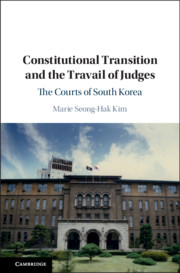Book contents
- Constitutional Transition and the Travail of Judges
- Constitutional Transition and the Travail of Judges
- Copyright page
- Dedication
- Contents
- Figures
- Tables
- Preface
- 1 Introduction
- 2 The Making of the Constitution and the Courts, 1945–1962
- 3 Jurisprudential Evolution, 1962–1972
- 4 The Yusin Era, 1972–1980 (1): The Laws
- 5 The Yusin Era, 1972–1980 (2): The Courts
- 6 The Yusin Era, 1972–1980 (3): The Judges
- 7 Political Transitions and Rule of Law, 1980–1987
- 8 Democracy and Travails of Judges, 1987 to the Present
- 9 Conclusion
- Bibliography
- Index
3 - Jurisprudential Evolution, 1962–1972
Published online by Cambridge University Press: 23 July 2019
- Constitutional Transition and the Travail of Judges
- Constitutional Transition and the Travail of Judges
- Copyright page
- Dedication
- Contents
- Figures
- Tables
- Preface
- 1 Introduction
- 2 The Making of the Constitution and the Courts, 1945–1962
- 3 Jurisprudential Evolution, 1962–1972
- 4 The Yusin Era, 1972–1980 (1): The Laws
- 5 The Yusin Era, 1972–1980 (2): The Courts
- 6 The Yusin Era, 1972–1980 (3): The Judges
- 7 Political Transitions and Rule of Law, 1980–1987
- 8 Democracy and Travails of Judges, 1987 to the Present
- 9 Conclusion
- Bibliography
- Index
Summary
This chapter examines jurisprudential evolution during the Third Republic under President Park Chung Hee, from 1962 to 1972. The record of the Supreme Court during this period shows that strong deference to the legislature and the executive branch prevailed in constitutional interpretation. Political questions were largely shielded from judicial interference. National security issues continued to play an important role, as seen in the Minbiyon and the Tongbaengnim (East Berlin) cases in the late 1960s. The State Tort Claims Act case of 1971 marked the first and the only time before 1987 that the Supreme Court declared the unconstitutionality of a statute on substantive grounds and refused to enforce it. After this monumental decision, the Court returned to its traditional position of refraining from rendering a constitutional ruling on sensitive political matters. The judicial strike in 1971 reveals the uneasy relationship between judges and prosecutors.
Keywords
- Type
- Chapter
- Information
- Constitutional Transition and the Travail of JudgesThe Courts of South Korea, pp. 57 - 107Publisher: Cambridge University PressPrint publication year: 2019



